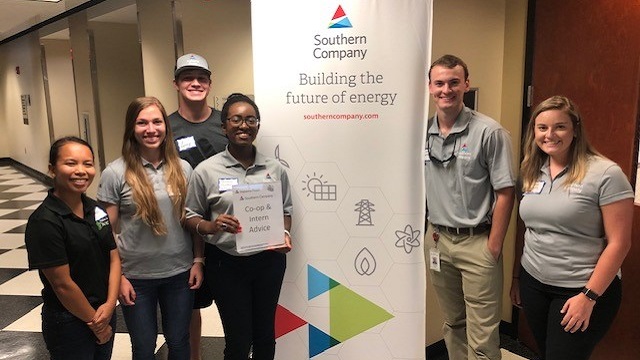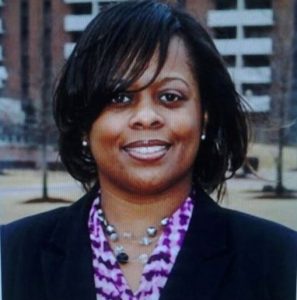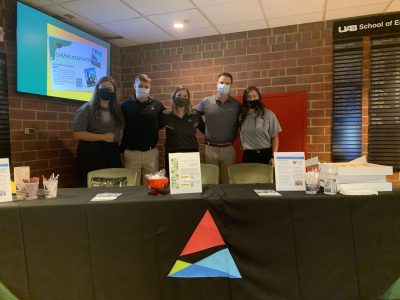Southern Company’s Campus Activity Teams help recruiters close the deal with job candidates

Southern Company’s Campus Activity Teams are crucial in recruiting future employees at college campuses. (contributed)
Organizers aren’t sure when or how Southern Company’s Campus Activity Teams got started, but they say hiring the state’s best and brightest wouldn’t be possible without them.
Campus Activity Teams, or CAT, is a group of employees who volunteer to represent the company on college campuses around the state and beyond. The volunteers inform students about co-op, internship and employment opportunities and answer questions about what it’s like to work for Southern Company’s family of utilities, including Alabama Power.
Tondra Fields, campus recruiting manager for Southern Company, said, “CAT teams are a valuable resource in the recruiting process because they help us close the deal.”
CAT members provide insight into the company’s culture, work and people. “As recruiters, we appreciate the work of the CAT teams because they help us promote Southern Company as an employer of choice,” Fields said, “and that is the reason we are able to attract and recruit top talent.”

Tondra Fields, campus recruiting manager for Southern Company. (contributed)
Employees can volunteer on school-specific CAT teams with management approval or be selected for department CAT teams. The goal is to have a diverse mix of new hire, mid-career and tenured employees who can offer different perspectives to attract and recruit candidates. Volunteers are asked to commit to at least one recruiting event per semester.
Departments have teams that can help promote their opportunities because the competition to find good job candidates is not just external but internal as well. That’s where the Power Delivery (PD) department at Alabama Power shines. It has had CAT teams in place for a long time, and managers understands the value of having a presence at recruiting events to brand, attract and market opportunities.
“For Power Delivery, the student program is truly a pipeline of talent,” Fields said. “They have a well-oiled machine when it comes to their CAT teams. They are like scouts. They come out in numbers to a recruiting event to see the candidates.
“They engage with them to assess their interest; they connect candidates with other PD employees to help answer questions and they provide input to hiring managers on candidate fit and placement within Power Delivery,” she said. “After a candidate finishes interacting with a Power Delivery CAT team member, they know what they will do as a co-op or intern, as well as what a future career could look like with our company.”
Other departments that have organized active CATs are Generation, Operations, Accounting/Finance/Treasury, and Sales and Marketing.
As campus recruiting manager, Fields sets strategic direction for the campus team and makes sure there are opportunities to place recruits within the company. Her team consists of four recruiters and one student program coordinator, with one of the recruiters specifically focused on diversity, equity and inclusion.
“Our student program is primarily engineering; therefore our core school list comprised 16 colleges and universities within our footprint with ABET-accredited engineering programs,” Fields said. “With our move to equity initiatives, we added eight HBCUs (historically Black colleges and universities) this year, in addition to our continued national partnerships with organizations such as NSBE (National Society of Black Engineers), SWE (Society of Women Engineers) and INROADS to help attract a more diverse talent pipeline.”
CAT members are required to go through an inclusive practices training.
As part of championing diversity, equity and inclusion, the Power Delivery department often pairs interns with mentors to train and retain minority hires. George Dobbins, interconnections and policy manager for Power Delivery at Alabama Power, explained that mentorship, even in its simplest form, guides a new hire through the transition from college to the corporate world.

George Dobbins, interconnections and policy manager in Power Delivery for Alabama Power. (contributed)
“For many of us, we experience a few hurdles and challenges adapting to the transition. While all employees experience some challenges, the experience for people of color and women carries a few more hurdles and challenges,” Dobbins said. “Mentorship helps to point out those hurdles before they prove a detriment to the mentee.”
Mentorship, he said, often occurs naturally, but those developmental relationships are especially vital to the success of minorities and women employees.
“In many cases there isn’t anyone in the office who looks like them or has the same interests or experiences as them, which is often a barrier to finding a mentor. This makes it a little more difficult to fit in and be comfortable at work,” he said. “Active mentorship helps facilitate relationships with a broader range of mentors to find the best fit for each employee. There are a number of surveys and studies that show how mentorship increases employee retention.”

Southern Company’s Campus Activity Teams are crucial in recruiting future employees at college campuses. (contributed)
CAT members who support the recruitment process is where the engagement starts. Mentorship is where the engagement continues, ensuring that the company maintains a strong, diverse pipeline of talented employees ensuring its future success.
“Each CAT consists of a recruiting consultant who coordinates campus activities, a management/executive sponsor, a CAT team lead and employee volunteers,” Dobbins said. “They participate in career fairs, career prep workshops, professional society meetings and any other activity that increases the company’s presence on campus.”
Here’s the list of colleges and universities that participate in the CAT program:
*Alabama A&M
Auburn
*Clark Atlanta
*Fort Valley
Georgia State
Georgia Southern
Georgia Tech
*Howard
*Jackson State
Kennesaw State
Mississippi State
*Morehouse
*North Carolina A&T
*Spelman
*Tennessee State
*Tuskegee
University of Alabama
UAB
University of Florida
University of Georgia
University of Illinois (Chicago)
UPRM
University of South Alabama
University of Tennessee
To learn more about careers at Alabama Power, click here.
*Historically Black colleges and universities





